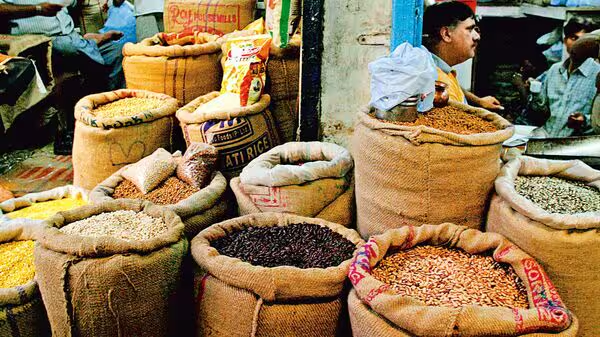



The government approved procuring moong and urad in Madhya Pradesh and Uttar Pradesh under the Price Support Scheme (PSS) to ensure farmers get remunerative prices. With an increased MSP for these pulses, the initiative aims to protect farmer incomes, reduce middlemen, and enhance domestic production to achieve self-sufficiency.

Copyright infringement not intended
Picture Courtesy: LIVEMINT
The Union Agriculture Minister has approved the procurement of moong (green gram) and urad (black gram) in Madhya Pradesh, and urad in Uttar Pradesh, under the Price Support Scheme (PSS).
It is a government intervention designed to protect farmers from the volatility of market prices. It functions as a safety net by guaranteeing the purchase of agricultural produce at a pre-determined Minimum Support Price (MSP).
The PSS is a vital component of the Pradhan Mantri Annadata Aay Sanrakshan Abhiyan (PM-AASHA), an umbrella scheme launched in 2018 to ensure that farming is a remunerative activity for farmers.
Preventing Distress Sales => It ensures farmers receive the MSP for their produce when market prices are low.
Crop Diversification => It encourages the cultivation of pulses and oilseeds, which are crucial for the nation's nutritional security and for reducing import dependency.
Buffer Stock Creation => The scheme helps in building a strategic reserve of these commodities.
The scheme comes into force when the market price of a notified commodity falls below its MSP.
Procurement Process => Central nodal agencies, in collaboration with state governments, purchase the produce directly from farmers at the declared MSP. The product must meet the Fair Average Quality (FAQ) standards.
Procurement Limit => Under normal circumstances, procurement is capped at 25% of the state's total production for that specific crop. However, for the procurement year 2024-25, the government has permitted the procurement of Tur, Urad, and Masur up to 100% of the state's production to boost domestic output.
Duration => Procurement operations continue until market prices stabilize at or above the MSP.
Financial Support => The Central Government bears the expenditure and any losses incurred during procurement operations.
The scheme is implemented through a collaborative effort between central and state-level agencies.
The primary agency is the National Agricultural Cooperative Marketing Federation of India (NAFED). It is supported by the National Cooperative Consumers' Federation of India (NCCF) and the Food Corporation of India (FCI), which steps in where NAFED's presence is limited.
The PSS is one of three sub-schemes under the PM-AASHA umbrella, offering states flexibility in implementation. The three components are:
A state can choose only one of the three schemes for a single commodity to avoid operational overlap.
Must Read Articles:
Source:
|
PRACTICE QUESTION Q. To be eligible for procurement under the Price Support Scheme, the farmer's produce must conform to: A) The Fair Average Quality (FAQ) specifications for that commodity. B) An organic certification standard as defined by APEDA. C) A minimum production threshold per hectare as notified by the state. D) A pre-registration on the e-NAM portal exclusively. Answer: A Explanation: For a farmer's produce to be eligible for procurement under the Price Support Scheme (PSS), it must conform to the Fair Average Quality (FAQ) specifications for that commodity. |






© 2026 iasgyan. All right reserved